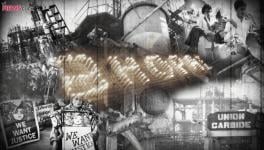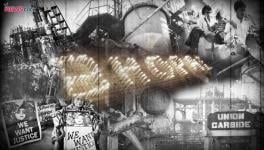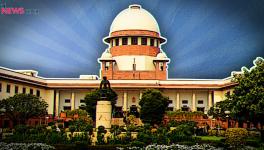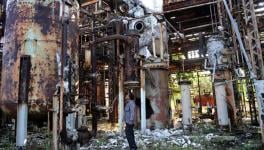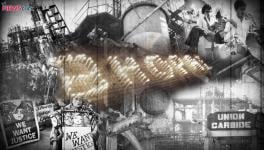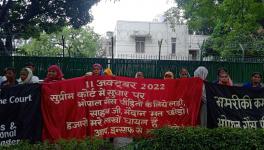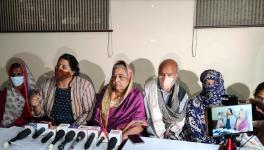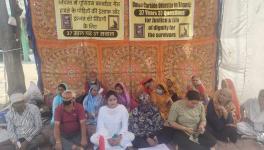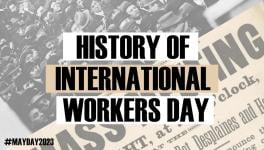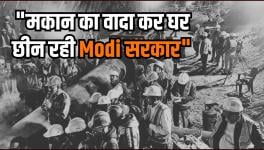Bhopal Judgment: An Insult to the Memory of Thousands Who Died
26 years after the world’s worst industrial disaster in the city of Bhopal killed over 20,000 people and caused serious disability to hundreds of thousands of others, a Bhopal Court on 7th June 2010 finally found Union Carbide Corporation of India (UCIL) and 7 senior officials of UCIL guilty of criminal negligence. The convicted include the venerable Keshub Mahindra, Chairman of the Mahindra and Mahindra conglomerate and one of the doyens of Indian industry. All of whom were sentenced to a mere 2 years imprisonment, the maximum permissible for this crime, and a fine of a paltry Rs.100,000. To the horror of victims and activists gathered outside the courtroom, all the convicted walked out on bail minutes afterwards the sentencing.
A charge of culpable homicide originally filed against them had inexplicably been dropped by the Supreme Court in 1996, thus placing the world’s worst industrial disaster on a par with some road accident. Shockingly, Justice Ahmadi even today justifies his then decision and the travesty of justice it stamped on the entire judicial proceedings against those responsible for this crime against humanity. Culpability was evident from clearly documented evidence, including by the Government of India’s Inquiry Committee headed by Dr.S.Varadarajan, which showed beyond doubt that the parent Union Carbide Corporation (UCC) and its Indian subsidiary UCIL knew well in advance that safety features available in the UCC plant in Virginia, USA had not been installed in Bhopal, that even the safety equipment available in Bhopal were under-designed and not functioning properly, and that various other safety features and procedures had been dropped in order to save money and increase profits.
All this was clear and willful misconduct in full knowledge of possible consequences, and thus tantamount to culpable homicide. Yet the Bhopal court verdict now suggests it was simply negligence on the part of the operating officials of UCIL. This is also the view pushed by UCC at the time of the disaster and during the judicial proceedings in India and the US, as well as by Dow Chemicals, the present owners of UCC, in order to escape responsibility and legal liability.
Sections of the national media initially hailed the verdict as one that would finally bring closure to the survivors and families of the victims, but back-tracked by evening in the face of furious reactions from activists as well as technical and legal experts. The US Assistant Secretary of State, Robert Blake, also issued a statement saying the verdict should bring closure. But nothing can be farther from the truth. The verdict only rubs salt into the wounds of victims and survivors. Those convicted are bound to go on a tortuous course of appeals. The verdict does not in any way close the case and is, in fact, just one more milestone in a protracted and sordid series of events going back to that fateful night in December 1984. Justice has not only been delayed and therefore denied, but also destroyed.
It also came as a rude shock that Accused No.1 in the trial Warren Anderson, Chairman of UCC at the time of the Bhopal disaster, a proclaimed an absconder by the Bhopal Court, does not figure anywhere in the verdict. The parent UCC incorporated in the US and its Asian Hong Kong-based subsidiary UCC Eastern also were not named. In all these years, the Government of India, whether led by the Congress or by the BJP, never seriously attempted to secure his extradition from the USA but instead did everything to facilitate his escaping beyond the reach of Indian law. Nor has the US government ever made any offer to facilitate bringing Anderson to justice. Even after the verdict, US government spokespersons shamelessly reiterated that since Anderson “was not personally involved,” there was no case against him and extradition was out of the question. This collusion between successive governments in India and the US has been cynically pursued in the interests of a budding US-India strategic partnership.
This is indeed too a high price for India to pay. The verdict and the long chain of events of which it is a part, are the result of the cumulative and possibly deliberate failures of the government’s investigative and prosecutorial agencies as well as of the Indian judicial system. These events show that MNCs, in particular US-based corporations, are beyond the pale of Indian law and will continue to be kept that way in order to showcase India as a safe destination for foreign investment. The message is that MNCs can operate freely in India with no accountability and no fear of prosecution or punitive action.
This is what the US is pushing hard for, and the Indian government seems to support, in the proposed Nuclear Liability Bill now being considered by India in which all responsibility lies with the Indian operator and none with the US technology provider. What happened with Bhopal will undoubtedly happen in nuclear power in case of an “accident”. UCC even today says it has no responsibility or liability for the Bhopal disaster since all actions were taken by its Indian subsidiary UCIL, even though defective technology as well as managerial systems and guidance flouting safety norms were clearly transferred from UCC to its Indian subsidiary. Dow Chemicals further says it has does not recognize the jurisdiction of Indian courts. It seems for US Corporations and for the US government it is only Indian money that matters, not Indian lives or Indian laws. Sadly, the Indian government too appears to be pandering to this view.
MNCs, corporate India, their supporters in government and major political parties that have ruled in Bhopal and New Delhi, and other sections blinded by visions of “shining India” have long considered the Bhopal disaster and the popular movements it gave rise to as an embarrassment, as something that should be buried and forgotten soon so that business-as-usual can proceed without hindrance. However, for the people of Bhopal and India, for the popular movements in India and all over the world that have fought to bring corporate criminals to justice and also to see that industrial and environmental policies are made fair, transparent and accountable to the public, this verdict can not be seen as a culmination but merely as more one more tragic event in a prolonged and on-going struggle.
Get the latest reports & analysis with people's perspective on Protests, movements & deep analytical videos, discussions of the current affairs in your Telegram app. Subscribe to NewsClick's Telegram channel & get Real-Time updates on stories, as they get published on our website.









